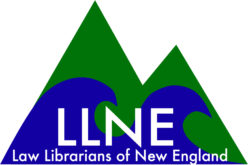The good news and bad news for you and your patrons is that you are not a lawyer. Because you are not a lawyer you are not expected to know every nuance of the law. However, because you are a librarian, you are probably expected to be helpful in some way.
We have developed the Legal Link to help you be helpful to your patrons without doing more than you might be comfortable doing or are legally permitted to do.
Some things to consider when undertaking legal reference:
- There are resources to help you! There is a comprehensive online toolkit which discusses many of the aspects of basic legal reference for public librarians available for free and maintained on an ongoing basis. This resource is a great go-to guide and is available at https://www.aallnet.org/lispsis/resources-publications/public-library-toolkit/. In addition, we are working on this Legal Link website to complement what is already out there and as an exclusively New England resource for public librarians.
- No one (or almost no one) comes to a public librarian with a law question and is not stressed out about it. Most patrons with legal questions are stressed out. Dealing with the law, courts, police, lawyers, and public officials is often stressful and many patrons only come into contact with the law when something has gone wrong in some way.
- Do not assume your patron is a criminal. Your patron might be a victim or a police officer or a friend of a victim or someone going through a personal struggle. I know this is obvious but it is worth reminding yourself. Just because sometimes our natural instinct is to be afraid, especially if the topics are sexual abuse, incest or domestic violence, don’t be.
- Your patron might be a criminal and that is ok, too. People accused of or convicted of crimes need legal information, too. Maybe even more so than people who are not involved with the criminal justice system.
- Do not give advice. Patrons often come up and ask if “something” is legal. This is a trap. Do not answer this question! The best response I have found is “I am not your attorney and can’t tell you what to do or advise you on how to interpret the law. However, I can help you find resources that might be helpful for your research.” (For more information, see our section on How Far to Go? What Should I Answer or Not Answer?)
- Ask for a citation. People come to the desk and say I want to read the “law” on this or that. The “law” is a very amorphous concept. It could include statutes or cases or rules or constitutions or municipal codes. Many times patrons do not understand the differences between the different types of law but they might have a citation. Citations are always a good place to start. (See below for more information on citations)
- Hedge your bets. Sometimes general non-legal reference is satisfying because you can help patrons find an answer. Unfortunately with law there is almost never one answer but many answers which require interpretation. Fight the urge to tell a patron you have found “the law” or “the case” or “the book” to answer their questions and instead try and more generally tell patrons you are hoping to find legal information which might be helpful to their ongoing legal research.
- You are not a lawyer! It’s ok that you don’t know everything. It’s ok that law is confusing. Worse case scenario, refer your patron to a local law library.
- Know your local Bar Association’s phone number. If a patron wants a lawyer, recommend they contact the state bar association. Your state’s bar association can help your patron be in contact with an attorney. Another list of numbers to have available are local legal aid clinics. Also helpful are court clerk phone numbers, domestic violence shelter phone numbers, victims’ rights information, police non-emergency numbers, and contact information for local legislatures.
This Legal Link portal is designed to help public librarians who are experts in information and service become familiar with basic legal research resources and skills.
